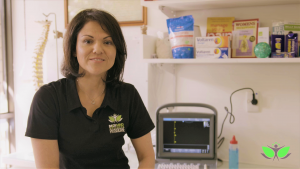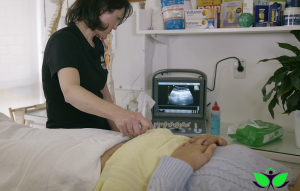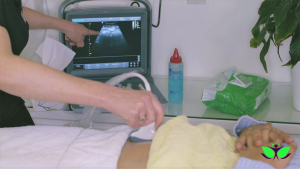Assessing Your Muscle Function
What does a Real-Time Ultrasound scan involve?
During the scan, your Physiotherapist will hold the ultrasound probe against your skin, using some gel to assist contact with the skin. Your physiotherapist will view images of your muscles working and will show you what the images mean. You can perform gentle exercises while you watch the screen. Once you’ve mastered the exercises with real-time ultrasound, you can use the same muscle actions throughout your exercise program. Images can be recorded and measured for future comparison.
If you are having a scan to assess your pelvic floor muscles, it is beneficial if an hour prior to your RTUS assessment you should empty your bladder and then drink 1-2 glasses of water. This will allow your bladder to be partially full and make it easier to view your pelvic floor and abdominal muscles without being uncomfortable.
Research has shown that during an episode of low back pain important core stabilising muscles contract poorly, in the wrong sequence and then waste away, long after the pain has settled. Using real-time ultrasound we can examine how the small stabilising muscles of the spine are functioning, so we can assess the size of the muscles, function, timing and contraction endurance of these muscles. This will assist you in identifying which muscles are causing your issues and reassure you with this visual real-time feedback that your muscles are contracting correctly. This will also enable a faster muscle re-education and training.
Quite often clients are instructed and shown how to activate their core, pelvic floor, hip and shoulder stabilisers but aren't certain if they're are doing this correctly. Real time ultrasound provides that visual feedback instantaneously so you can be assured that what you are doing and feeling is what will help you improve your condition.
With this machine we can also assess the muscles and tendons around the hip and shoulder and identify which muscles are injured, overactive, need therapy and isolate muscles that need to be strengthened.
Body Mind Wellness Physiocare uses Real Time Ultrasound to assess muscle function, especially pelvic floor and core muscles, within the body in real time. This technology is safe, effective, non-invasive and pain free. It provides you with immediate feedback of how your muscles are working.
What is Real-Time Ultrasound?
Real time ultrasound is the same type of ultrasound imaging technology that is used during pregnancy to view an unborn baby. However in physiotherapy it can be used to view and measure how your muscles work. Your Physiotherapist can use Real Time Ultrasound to show you the deep core stability muscles of your abdomen or lower back, your pelvic floor muscles, your gluteals muscles of your hip or your rotator cuff muscles of your shoulder. You will then be able to see, in real time, your muscles move and learn how to best switch-on the muscles to better support your movement.
What conditions can Real-Time Ultrasound be used for?
- Incontinence, Rectus Diastasis (separation of abdominal muscles), Pelvic Pain, Overactive Pelvic Floor, Pre/Post Natally for Lower Back/Pelvic/Rib Pain - Pelvic floor and Abdominal muscles are assessed and retrained, in adults and children non-invasively.
- Lower Back Pain, Pelvic Instability, SIJ (sacroiliac) Joint Pain, Pre-Post Spinal Surgery - Deep Abdominal Muscles and Deep Spinal Muscles which make up the "Core" stabilisers are assessed and retrained.
- Hip Trochanteric Bursitis, Gluteal Tendinopathies and Hip Joint Patholoty - Gluteal Muscles activation and activation of the deep hip muscles can also be assessed and trained using RTUS.
- Shoulder Subacromial/Subdeltoid Bursitis, Rotator Cuff Tendinopathies - These can be identified and Rotator Cuff muscles can be assessed and retrained to assist rehab from these conditions.
For the client it is reassuring and encouraging to see your muscles moving and know you are working the correct muscles effectively to assist your rehab.
Who can benefit from Real-Time Ultrasound?
Real time ultrasound is recommended for a wide range of people including:
- People with Low back pain (acute, chronic or recurrent) sacrioliac joint pain or pelvic instability
- Pre and Post spinal surgery
- Post partum or pre-natal mothers with low back, pelvic or rib pain.
- Individuals who require high levels of core stability
- Injured workers
- Athletes
- Bladder dysfunction
- Women/Men with Pelvic Pain and Overactive/Imbalanced Pelvic Floor
- Children who suffer with Incontinence
So book an appointment with one of our physiotherapists to have a Real-Time Ultrasound consult.



